
Few issues matter more to voters than the economy. Think taxes, jobs and wages, inflation, interest rates on loans, international trade, government spending priorities, deficits and regulation of the financial services sector.
Indeed, “the economy” is on the list of topics for the first presidential debate between President Donald Trump and former Vice President Joe Biden, which is Tuesday night.
As you listen to the comments of the 2020 presidential candidates, consider what some of their predecessors had to say about economic issues of the debates in years gone past.
Note that the modern, televised presidential debate tradition didn’t really begin until 1960 — when then-Vice President Richard M. Nixon squared off against then-Sen. John F. Kennedy.
1960: John F. Kennedy
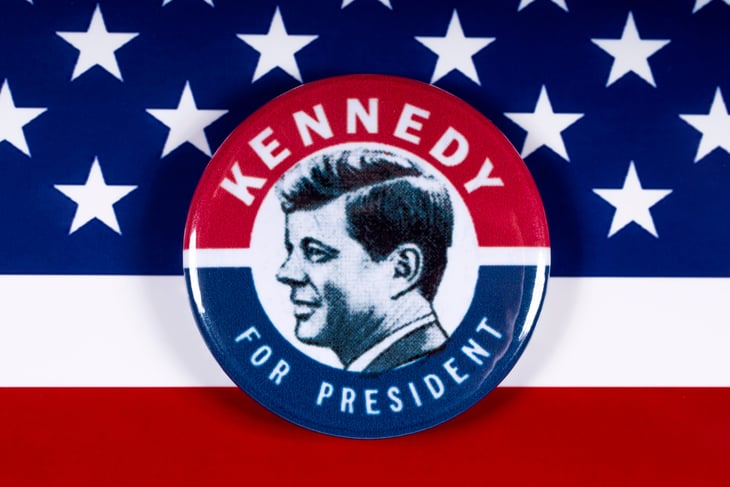
In the Kennedy-Nixon Presidential Debate on Sept. 26, 1960, then-senator John F. Kennedy said this about the economy at the time:
“I’m not satisfied to have 50 percent of our steel-mill capacity unused. I’m not satisfied when the United States had last year the lowest rate of economic growth of any major industrialized society in the world — because economic growth means strength and vitality. It means we’re able to sustain our defenses; it means we’re able to meet our commitments abroad.”
1960: Richard M. Nixon
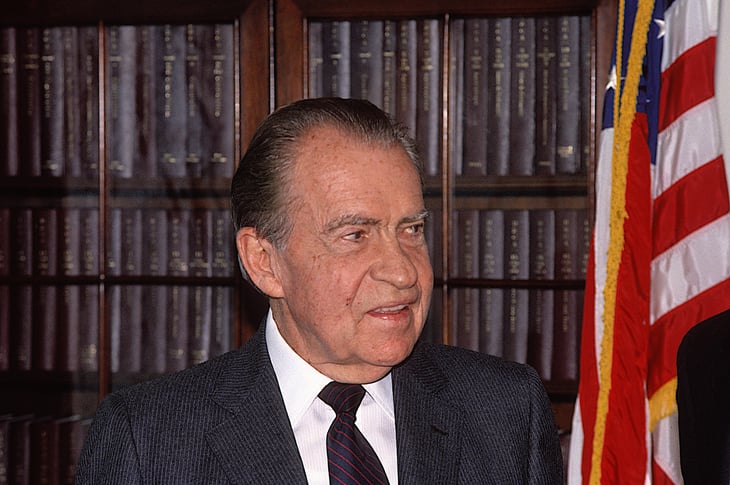
In the debate between Kennedy and Nixon on Oct. 13, 1960, Nixon, then vice president under President Dwight Eisenhower, put his comments about the U.S. economy in the context of the Cold War:
“… even though we have maintained, as I pointed out in our first debate, the absolute gap over the Soviet Union; even though the growth in this administration has been twice as much as it was in the Truman administration, that isn’t good enough because America must be able to grow enough not only to take care of our needs at home for better education and housing and health, all these things we want. We’ve got to grow enough to maintain the forces that we have abroad and to wage the non-military battle for the war — for the world, in Asia, in Africa and Latin America.”
1976: Gerald R. Ford
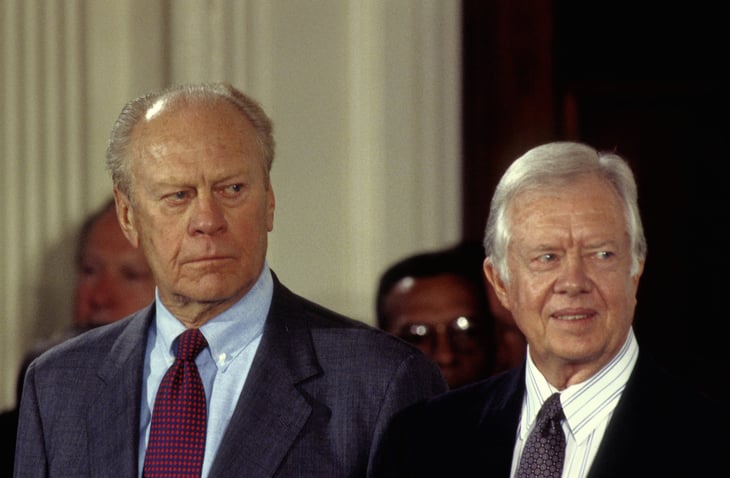
There were no presidential debates between 1960 and 1976. When debates did return in 1976, they pitted Republican President Gerald Ford (pictured at left) against former Georgia Gov. Jimmy Carter.
Ford was the only president in modern history not elected to the White House. President Richard Nixon appointed him to the vice presidency to replace Spiro Agnew, who resigned under pressure of an investigation into bribery and fraud. Ford stepped into the presidency in 1974 after Nixon himself resigned due to the Watergate scandal.
Here’s what Ford said on Sept. 23, 1976, about the economy, which had just emerged from a recession:
“In my judgment the best way to get jobs is to expand the private sector, where five out of six jobs today exist in our economy. We can do that by reducing Federal taxes, as I proposed about a year ago when I called for a tax reduction of $28 billion, three-quarters of it to go to private taxpayers and one-quarter to the business sector. We could add to jobs in the major metropolitan areas by a proposal that I recommended that would give tax incentives to business to move into the inner city and to expand or to build new plants so that they would take a plant or expand a plant where people are and people are currently unemployed.”
1976: Jimmy Carter
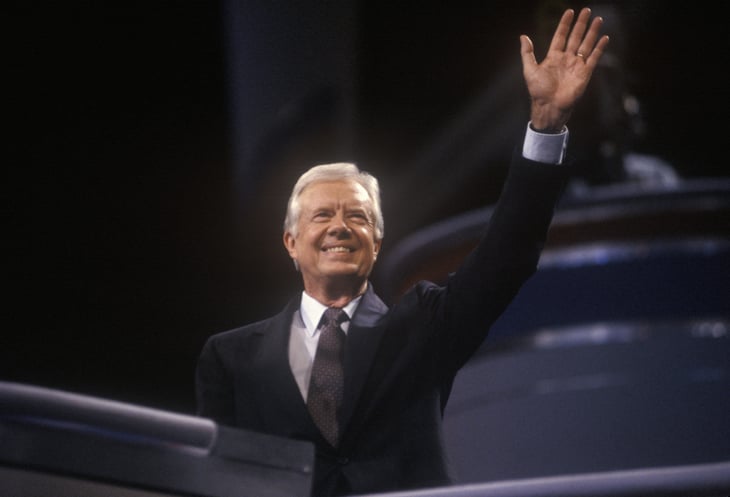
Former Georgia Gov. Jimmy Carter was an unknown in national politics until the Democrat started running for president. But over the course of the debates with President Ford, Americans learned a little more about the former peanut farmer and decorated naval officer.
Carter’s comments on the economy contributed to that understanding. Here’s what he said on Sept. 23, 1976, in his debate with Ford:
“The American people are ready to make sacrifices if they are part of the process, if they know that they will be helping to make decisions and won’t be excluded from being an involved party to the national purpose.
The major effort we must put forward is to put our people back to work. And I think that this is one example where a lot of people have selfish, grasping ideas now. I remember 1973 in the depth of the energy crisis when President Nixon called on the American people to make a sacrifice to cut down on the waste of gasoline, to cut down on the speed of automobiles. It was a tremendous surge of patriotism. “I want to make a sacrifice for my country.”
1980: Ronald Reagan
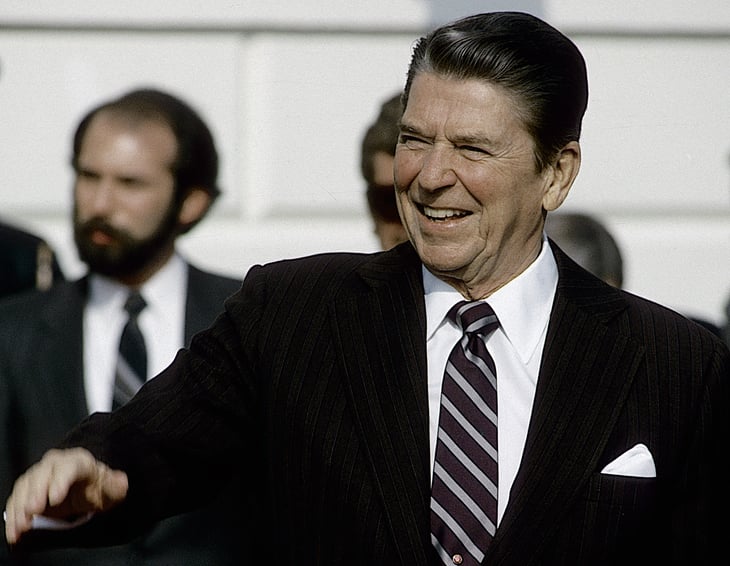
Ronald Reagan was not only a charismatic former actor and broadcaster, but also a former governor of California.
By the time he won the Republican nomination for the 1980 election and ran against President Jimmy Carter, Reagan had been dubbed “The Great Communicator,” often telling folksy stories to explain his views on complex problems. Reagan said about the economy in the debate on Sept. 21, 1980:
“I believe that inflation today is caused by government simply spending more than government takes in, at the same time that government has imposed upon business and industry, from the shopkeeper on the corner to the biggest industrial plant in America, countless harassing regulations and punitive taxes that have reduced productivity at the same time they have increased the cost of production.
And when you are reducing productivity at the same time that you are turning out printing-press money in excessive amounts, you’re causing inflation. And it isn’t really higher prices, it’s just, you are reducing the value of the money. You are robbing the American people of their savings.”
1980: Jimmy Carter

Democratic President Jimmy Carter had a difficult race in 1980. The economy was still in rough shape and Iran was holding Americans hostage.
Carter defended his administration’s economic record in the debate of Oct. 28, 1980:
“In 1974, we had the worst recession, the deepest and most penetrating recession since the Second World War. The recession that resulted this time was the briefest since the Second World War.
In addition, we’ve brought down inflation. Earlier this year, in the first quarter, we did have a very severe inflation pressure brought about by the OPEC price increase. It averaged about 18% in the first quarter of this year. In the second quarter, we had dropped it down to about 13%. The most recent figures, the last three months, on the third quarter of this year, the inflation rate is 7% — still too high, but it illustrates very vividly that in addition to providing an enormous number of jobs — nine million new jobs in the last three and a half years — that the inflationary threat is still urgent on us.”
1984: Walter Mondale
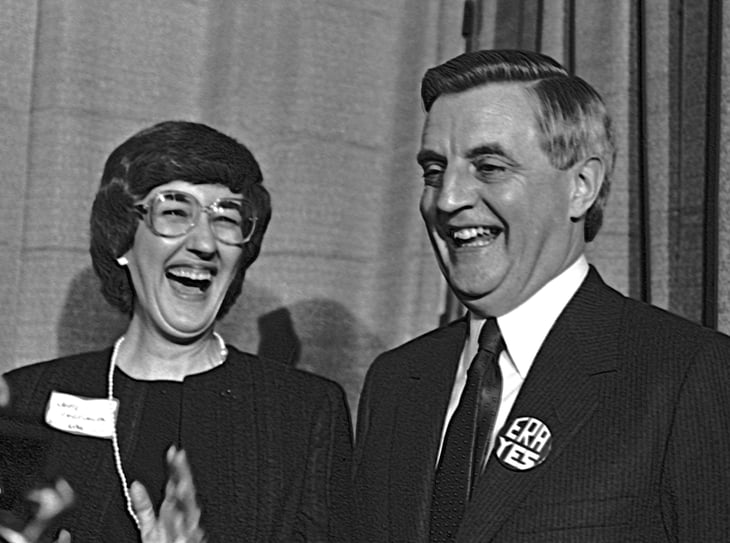
In this election, Jimmy Carter’s former vice president, Walter Mondale, faced Reagan in a bid to win the White House back for the Democrats.
Here’s how he made his economic case in the presidential debate of Oct. 8, 1984,
“And perhaps the dominant domestic issue of our times is what do we do about these enormous deficits. I respect the president; I respect the presidency, and I think he knows that. But the fact of it is, every estimate by this administration about the size of the deficit has been off by billions and billions of dollars.
As a matter of fact, over four years, they’ve missed the mark by nearly $600 billion. We were told we would have a balanced budget in 1983. It was a $200 billion deficit instead. And now we have a major question facing the American people as to whether we’ll deal with this deficit and get it down for the sake of a healthy recovery. Virtually every economic analysis that I’ve heard of, including the distinguished Congressional Budget Office, which is respected by, I think, almost everyone, says that even with historically high levels of economic growth, we will suffer a $263 billion deficit.”
1984: Ronald Reagan
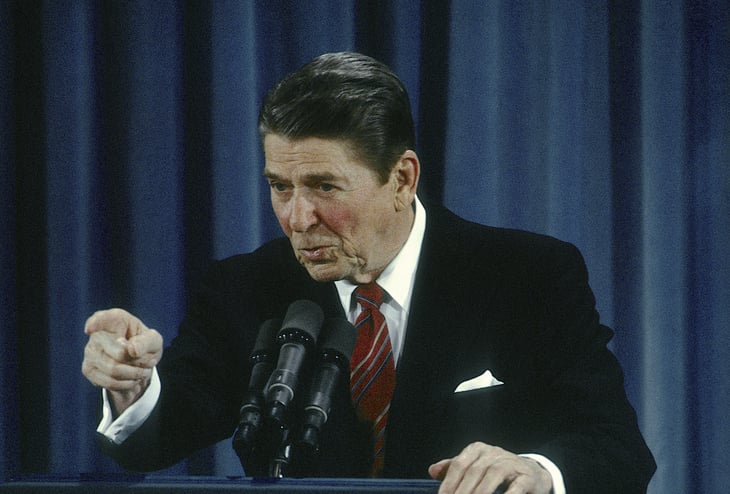
President Ronald Reagan came to the 1984 debates after a tumultuous first term during which he survived an assassination attempt, and faced questions about the deaths of 241 servicemen in Beirut (killed in a terrorist bombing attack on their barracks) and tensions with the Soviet Union.
Ultimately, Reagan won in a landslide and set a new record for the number of Electoral College votes won: 525 electoral votes, from a possible total of 538.
Reagan said in the debate of Oct. 7, 1984:
“I don’t believe that Mr. Mondale has a plan for balancing the budget; he has a plan for raising taxes. And, as a matter of fact, the biggest single tax increase in our nation’s history took place (in) 1977. And for the five years previous to our taking office, taxes doubled in the United States, and the budgets increased $318 billion. So, there is no ratio between taxing and balancing a budget. Whether you borrow the money or whether you simply tax it away from the people, you’re taking the same amount of money out of the private sector, unless and until you bring down government’s share of what it is taking.
With regard to Social Security, I hope there’ll be more time than just this minute to mention that, but I will say this: A president should never say, ‘Never.’ But I’m going to violate that rule and say, ‘Never.’ I will never stand for a reduction of the Social Security benefits to the people that are now getting them.”
To learn where the current presidential candidates stand on Social Security, check out “5 Ways Joe Biden Wants Social Security to Change.”
1988: George H.W. Bush
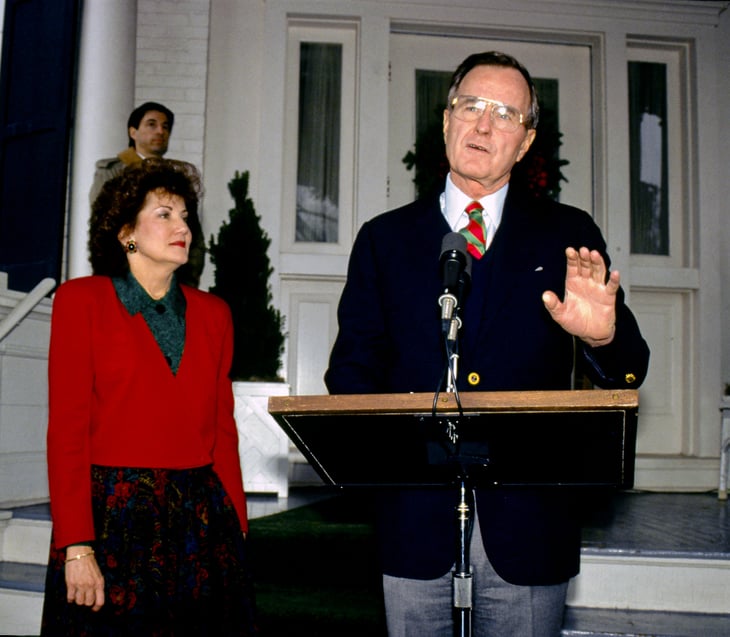
By the time that George H.W. Bush ran for president in 1988, he had been waiting in the wings for eight years as Ronald Reagan’s vice president.
Bush tackled a budget question in the Sept. 25, 1988, debate with the Democratic challenger, Massachusetts Gov. Michael Dukakis:
“I would like a balanced budget amendment. But the dynamics of the economy — we cut the taxes, and revenues are up by 25% in three years. So the problem is — it’s not that the working is being taxed too little or the person working out – the woman working in some factory being taxed too little. It is that we are continuing to spend too much. So, my formula says grow at the rate of inflation. Permit the president to set the priorities on where we do the spending.”
1988: Michael Dukakis
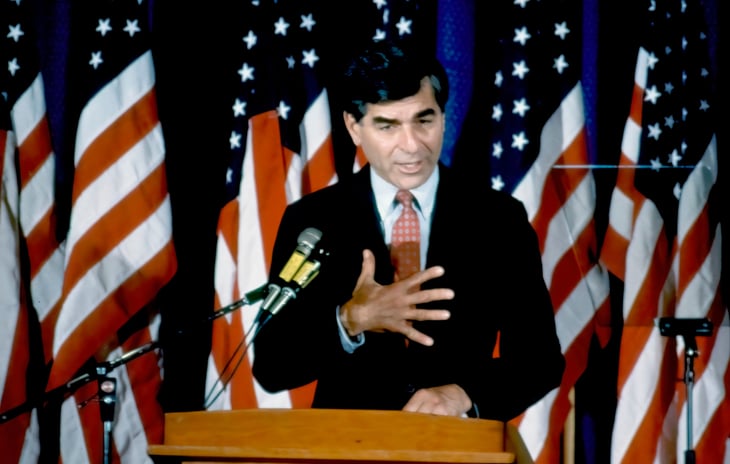
Michael Dukakis had a real opportunity in 1988 to win back the White House for the Democrats, despite the huge popularity of outgoing President Ronald Reagan. The country was still running a huge deficit and digesting the aftermath of the Iran-Contra scandal.
Here’s what Dukakis had to say in the presidential debate of Oct. 13, 1988:
“I think it’s unconscionable…that we should be talking or thinking about imposing new taxes on average Americans when there are billions out there, over $100 billion, in taxes owed that aren’t being paid. Now, I think if we work together on it, and if you have a president that will work with the Congress and the American people, we can bring that deficit down steadily, $20, $25, $30 billion a year, build economic growth, build a good strong future for America, invest in those things which we must invest in economic development, good jobs, good schools for our kids, college opportunity for young people, decent health care and affordable housing, and a clean and safe environment.”
1992: Ross Perot
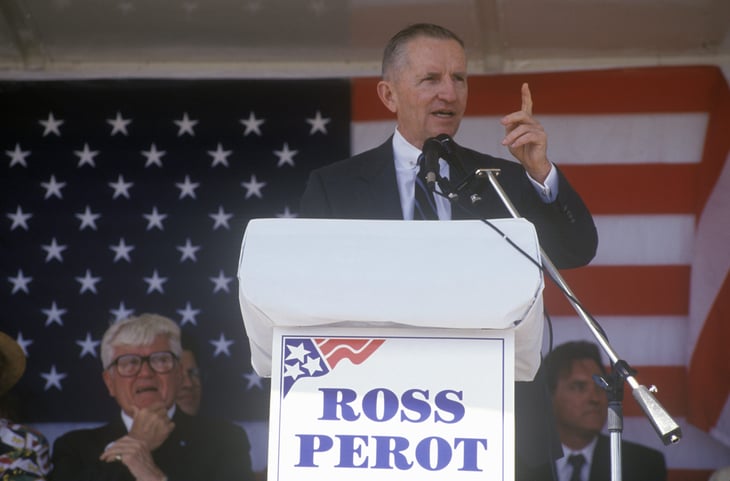
The first Clinton-Bush-Perot presidential debate was unique in a couple of ways. First, it featured three debaters — not the usual two representing the major parties. Second, the third-party candidate was a political outsider, billionaire businessman Ross Perot.
Perot said in the presidential debate of Oct. 11, 1992:
“I don’t have any experience in running up a $4 trillion debt. (Laughter) I don’t have any experience in gridlock government where nobody takes responsibility for anything and everybody blames everybody else. I don’t have any experience in creating the worst public school system in the industrialized world, the most violent crime-ridden society in the industrialized world.
But I do have a lot of experience in getting things done. So, if we’re at a point in history where we want to stop talking about it and do it, I’ve got a lot of experience in figuring out how to solve problems, making the solutions work, and then moving on to the next one.”
1992: Bill Clinton
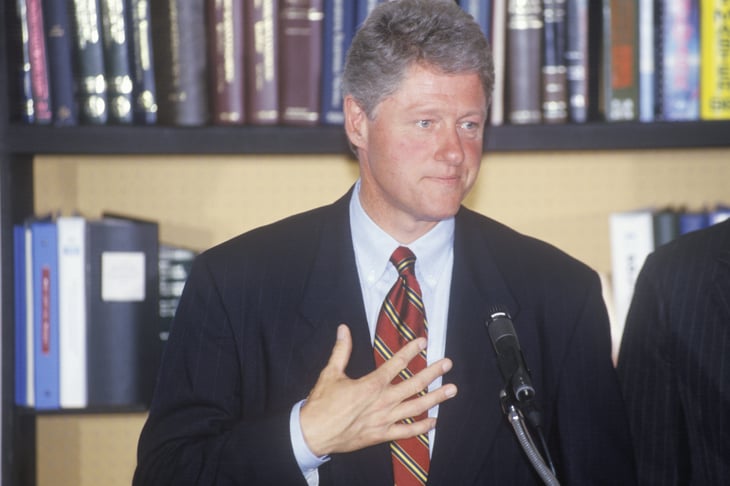
In a bid to win back the White House after 12 years of Republican control, the Democratic governor of Arkansas discussed complex issues that later earned him the unofficial title “Explainer in Chief.”
In the debate of Oct. 15, 1992, Clinton laid out his assessment of the country’s economic ills:
Most people are working harder for less money than they were making 10 years ago. It is because we are in the grip of a failed economic theory. And this decision you’re about to make better be about what kind of economic theory you want, not just people saying I’m going to go fix it, but what are we going to do? I think we have to do is invest in American jobs, American education, control American health care costs and bring the American people together again.”
1992: George H.W. Bush
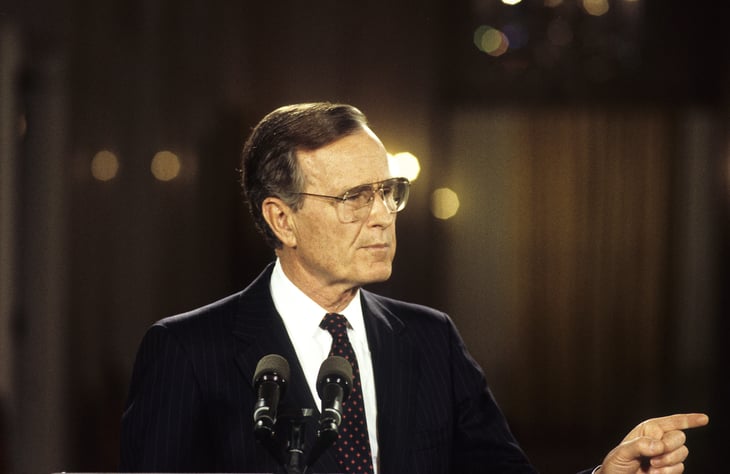
When President George H.W. Bush faced off against Bill Clinton and Ross Perot in 1992, it was at the end of a tough four years in the White House.
His presidency started with a lot of hope, particularly in the first year as Warsaw Pact countries broke away from the Soviet Union and Bush worked with Soviet President Mikhail Gorbachev on nuclear disarmament.
But by 1992, Gorbachev was gone from power, Russia was looking shaky and the economy was strained.
In the debate on Oct. 15, 1992, Bush responded to the calls for change in economic policy:
“One thing I’ve called for that has been stymied, and I’ll keep on working for it, is a whole financial reform legislation. It is absolutely essential in terms of bringing our banking system and credit system into the new age instead of having it living back in the dark ages. And it’s a big fight. “
1996: Bob Dole
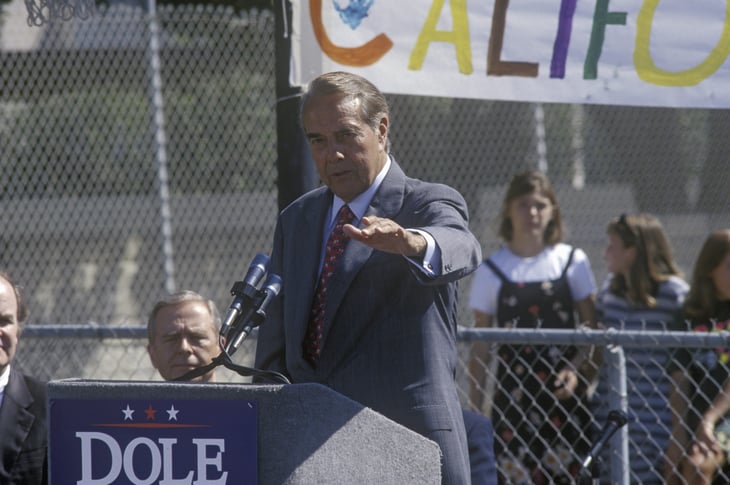
When Kansas Sen. Bob Dole took to the debate stage in 1996 to challenge President Bill Clinton, he was talking to a country that was experiencing a strong economic recovery.
Dole’s pitch on the economy had a “yes, but” flavor to it. Here’s a sample, from the presidential debate on Oct. 6, 1996:
“We ask the people that are viewing tonight, are you better off than you were four years ago? It’s not whether we’re better off, it’s whether they’re better off.
Are you working harder to put food on the table, feed your children. Are your children getting a better education. Drug use has doubled the past 44 months all across America. Crime has gone down, but it’s because the mayors like Rudy Giuliani where one-third of the drop happened in one city, New York City.”
1996: Bill Clinton
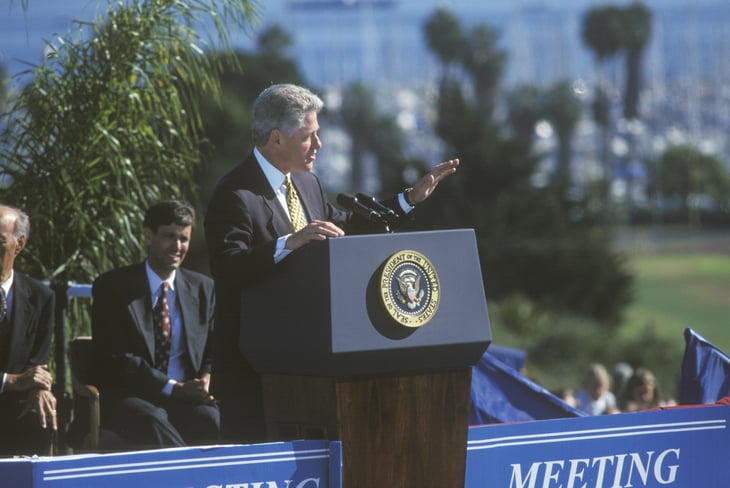
For President Bill Clinton, the job was somewhat easier. He had a recovering economy to leverage in the 1996 presidential debates.
Here’s what Clinton said in the presidential debate on Oct. 6, 1996:
“Four years ago you took me on faith. Now there’s a record: Ten and a half million more jobs, rising incomes, falling crime rates and welfare rolls, a strong America at peace.
We are better off than we were four years ago. Let’s keep it going. We cut the deficit by 60%. Now, let’s balance the budget and protect Medicare, Medicaid, education and the environment. We cut taxes for 15 million working Americans. Now let’s pass the tax cuts for education and child rearing, help with medical emergencies, and buying a home.”
2000: Al Gore
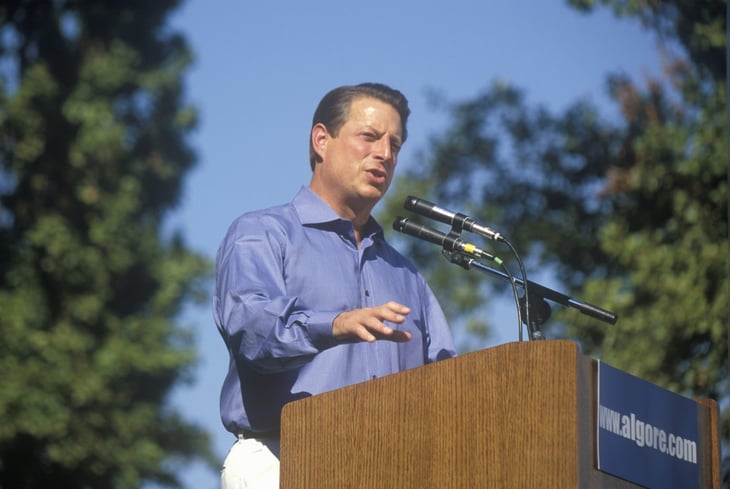
Clinton’s vice president, Al Gore, ran for president in 2000. He was able to address a rare topic in his debate with Texas Gov. George W. Bush: how to spend a government surplus.
Here’s Gore’s promise in the Oct. 3, 2000, presidential debate:
“I think this is a very important moment for our country. We have achieved extraordinary prosperity. And in this election, America has to make an important choice. Will we use our prosperity to enrich not just the few, but all of our families? I believe we have to make the right and responsible choices. If I’m entrusted with the presidency, here are the choices that I will make. I will balance the budget every year. I will pay down the national debt. I will put Medicare and Social Security in a lockbox and protect them. And I will cut taxes for middle-class families.”
To learn where the current presidential candidates stand on Social Security, check out “5 Ways Joe Biden Wants Social Security to Change.”
2000: George W. Bush
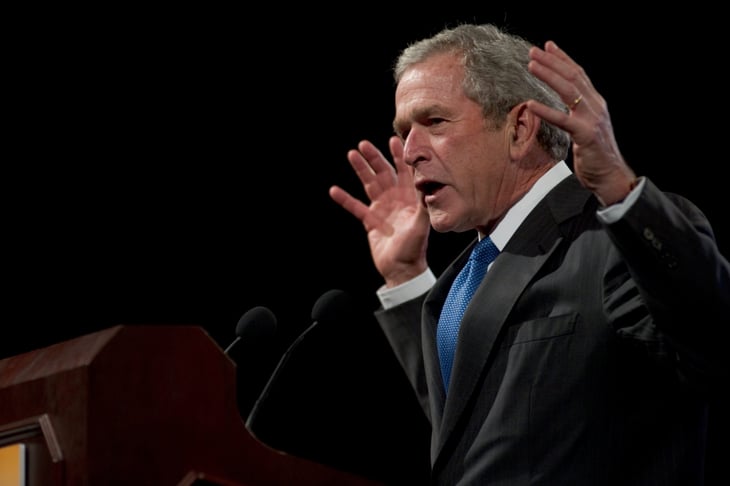
George W. Bush, who ultimately would win the presidency, wanted to give some of the budget surplus back directly to taxpayers.
Here’s how he put it in the Oct. 3, 2000, presidential debate:
“I want to take one-half of the surplus and dedicate it to Social Security. One-quarter of the surplus for important projects, and I want to send one-quarter of the surplus back to the people who pay the bills. I want everybody who pays taxes to have their tax rates cut. And that stands in contrast to my worthy opponent’s plan, which will increase the size of government dramatically. His plan is three times larger than President Clinton’s proposed plan eight years ago. It is a plan that will have 200 new programs — expanded programs and creates 20,000 new bureaucrats. It empowers Washington.”
2004: John Kerry
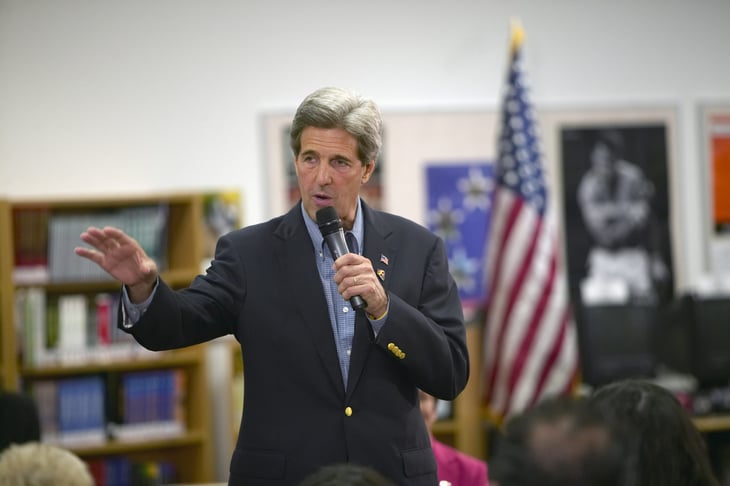
When President George W. Bush faced Massachusetts Sen. John Kerry in 2004, the U.S. was involved in wars in Afghanistan and Iraq after suffering devastating terrorist attacks on Sept. 11, 2001.
Kerry spoke about economic issues on Oct. 8, 2004:
“The president has presided over an economy where we’ve lost 1.6 million jobs. The first president in 72 years to lose jobs. I have a plan to put people back to work. … I’m going to close the loopholes that actually encourage companies to go overseas. The president wants to keep them open. I think I’m right. I think he’s wrong. I’m going to give you a tax cut. The president gave the top 1% of income-earners in America, got $89 billion last year, more than the 80% of people who earn $100,000 or less all put together. I think that’s wrong.”
2004: George W. Bush
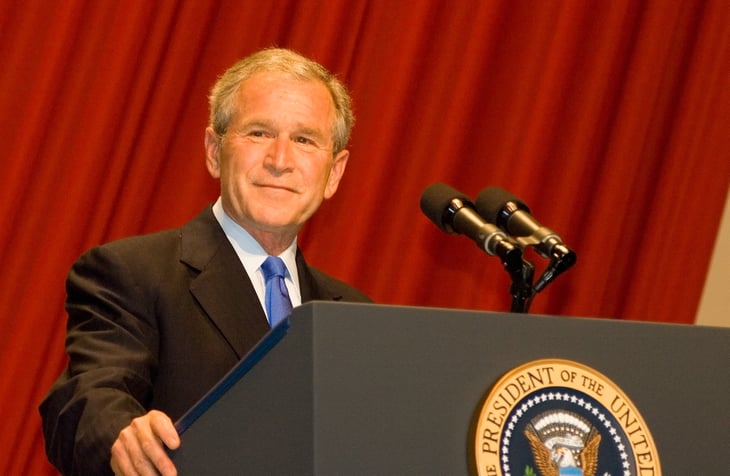
President Bush’s successful pitch to Americans for his re-election in 2004 was focused largely on keeping the country safe.
He summed up his economic approach in Oct. 8, 2004:
“Tonight I had a chance to discuss with you what to do to keep this economy going: keep the taxes low, don’t increase the scope of the federal government, keep regulations down, legal reform, a health care policy that does not empower the federal government but empowers individuals, and an energy plan that will help us become less dependent on foreign sources of energy.”
2008: Barack Obama
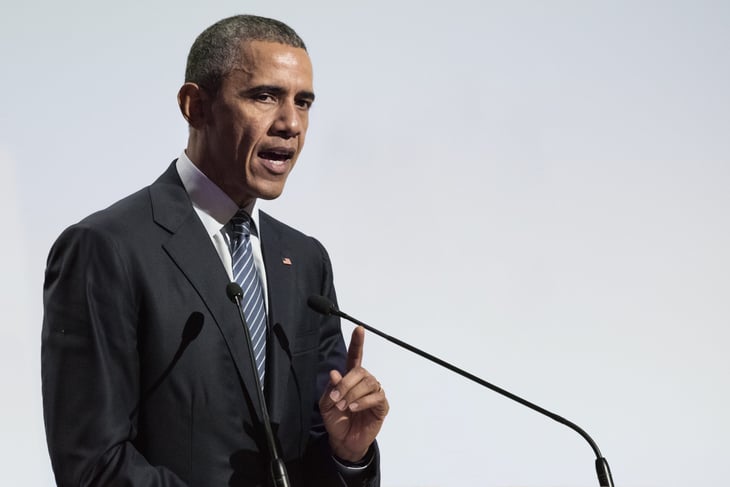
As Illinois Sen. Barack Obama took the stage for his Oct. 7, 2008, debate against Arizona Sen. John McCain, the nation was in the midst of a massive economic crisis. Banks, insurance companies, the stock market and the real estate market were failing.
Obama said:
“Step one was a rescue package that was passed last week. We’ve got to make sure that works properly. And that means strong oversight, making sure that investors, taxpayers are getting their money back and treated as investors.
It means that we are cracking down on CEOs and making sure that they’re not getting bonuses or golden parachutes as a consequence of this package. And, in fact, we just found out that AIG, a company that got a bailout, just a week after they got help, went on a $400,000 junket.
And I’ll tell you what, the Treasury should demand that money back and those executives should be fired. But that’s only step one. The middle class need a rescue package.”
2008: John McCain

Sen. John McCain spoke about the pressing issue of the day: the economy. Here’s what he said about it on Oct. 7, 2008:
You know that home values of retirees continues to decline and people are no longer able to afford their mortgage payments. As president of the United States, Alan, I would order the secretary of the Treasury to immediately buy up the bad home loan mortgages in America and renegotiate at the new value of those homes — at the diminished value of those homes and let people be able to make those — be able to make those payments and stay in their homes.
Is it expensive? Yes. But we all know, my friends, until we stabilize home values in America, we’re never going to start turning around and creating jobs and fixing our economy. And we’ve got to give some trust and confidence back to America.”
2012: Barack Obama
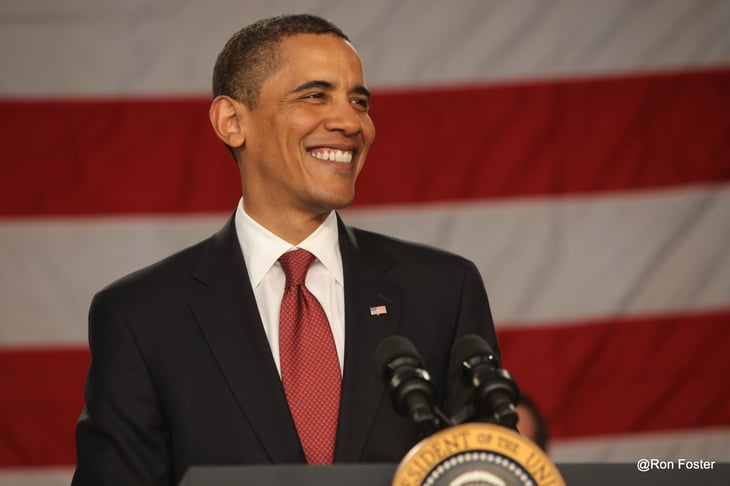
By 2012, President Barack Obama had taken the country through the worst of a major recession and was now debating with opponent and former Massachusetts Gov. Mitt Romney over their plans to finish getting the economy on track.
Obama’s argument in the debate of Oct. 16, 2012, rested in part on casting Romney as a man who would cater to the wealthiest Americans, at the expense of the middle class and poor:
“You can make a lot of money and pay lower tax rates than somebody who makes a lot less. You can ship jobs overseas and get tax breaks for it. You can invest in a company, bankrupt it, lay off the workers, strip away their pensions, and you still make money.
That’s exactly the philosophy that we’ve seen in place for the last decade. That’s what’s been squeezing middle-class families. And we have fought back for four years to get out of that mess.”
2012: Mitt Romney
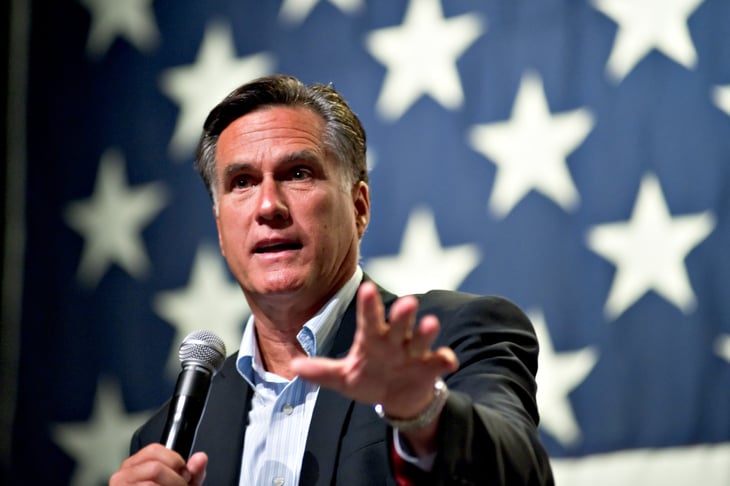
Former Massachusetts Gov. Mitt Romney worked to connect with those hard hit by the Great Recession, many of whom had not yet found work.
On Oct. 16, 2012, Romney said:
“Well what you’re seeing in this country is 23 million people struggling to find a job. And a lot of them … have been out of work for a long, long, long time. The president’s policies have been exercised over the last four years, and they haven’t put Americans back to work. We have fewer people working today than we had when the president took office. If the — the unemployment rate was 7.8% when he took office, it’s 7.8% now. But if you calculated that unemployment rate, taking back the people who dropped out of the workforce, it would be 10.7%.”
2016: Donald J. Trump
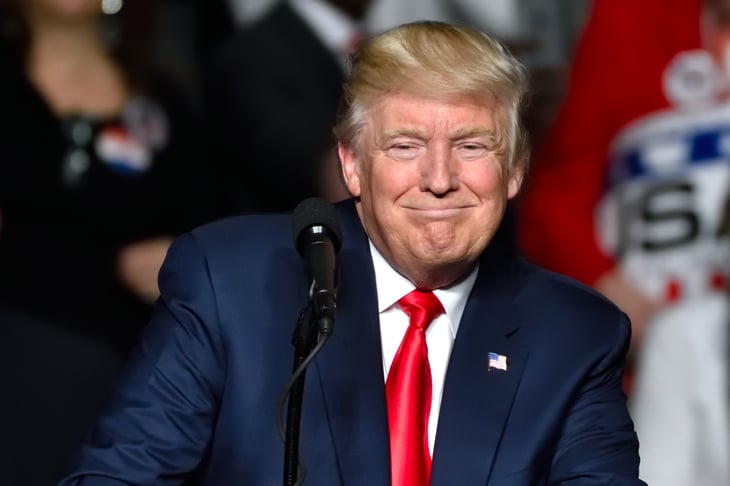
The economy had recovered from the Great Recession by 2016, but the finances of many Americans still were reeling and job growth was lagging.
Donald Trump made the economy a centerpiece of his campaign, promising to raise spending for infrastructure and defense while cutting social programs. In the presidential debate of Oct. 19, 2016, he said:
“… I’m going to create tremendous jobs. And we’re bringing GDP from, really, 1%, which is what it is now, and if she got in, it will be less than zero. But we’re bringing it from 1% up to 4%. And I actually think we can go higher than 4%. I think you can go to 5% or 6%. And if we do, you don’t have to bother asking your question, because we have a tremendous machine. We will have created a tremendous economic machine once again. To do that, we’re taking back jobs.”
2016: Hillary R. Clinton
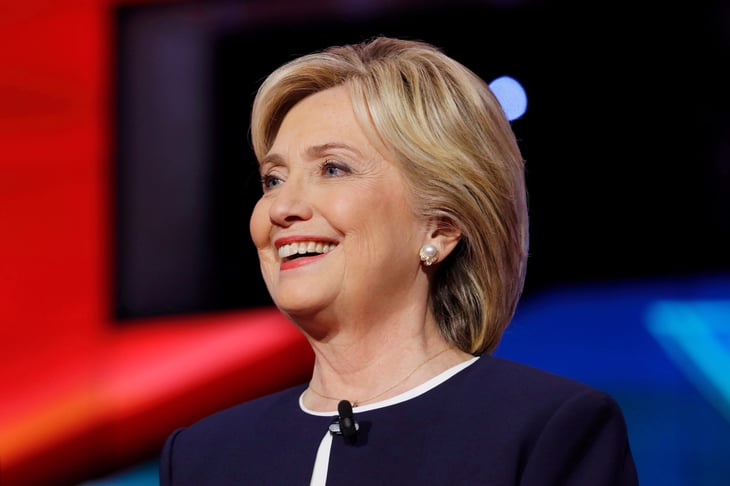
Hillary Clinton had detailed plans for encouraging growth and investing in education, infrastructure, job training and clean energy. She supported raising the federal minimum wage and improving child care and paid leave to support families.
In the presidential debate of Oct. 19, 2016, Clinton said:
“So when I talk about how we’re going to pay for education, how we’re going to invest in infrastructure, how we’re going to get the cost of prescription drugs down, and a lot of the other issues that people talk to me about all the time, I’ve made it very clear we are going where the money is. We are going to ask the wealthy and corporations to pay their fair share.
… We’ve got to get back to rebuilding the middle class, the families of America. That’s where growth will come from. That’s why I want to invest in you. I want to invest in your family.”






Add a Comment
Our Policy: We welcome relevant and respectful comments in order to foster healthy and informative discussions. All other comments may be removed. Comments with links are automatically held for moderation.